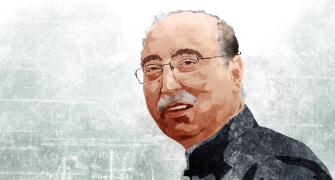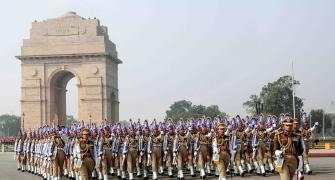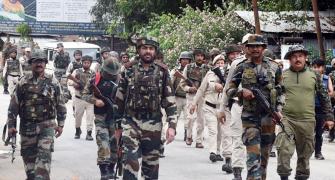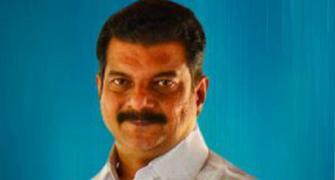It was only a matter of hours before I would be declared persona non grata; all my work would turn to ashes, and I would be revealed as a typical untrustworthy Indian.
I steeled myself for the axe to fall.
A must-read excerpt from Mani Shankar Aiyar's Memoirs of A Maverick: The First Fifty Years (1941-1991).

Through the year 1980, I had off and on received calls from someone calling himself 'Shaheed', asking to meet me.
I had replied 'Shaheed' (meaning 'martyr') is not a name and I would not give him an appointment until he told me his real name and gave me an indication of what he wanted to talk about. He had declined.
On 25 December, the birthday shared by Jesus Christ, Muhammad Ali Jinnah, Atal Bihari Vajpayee and Nawaz Sharif, I was at home. My doorbell rang.
I opened the door, and there stood a young man who beamed and said he was 'Shaheed'.
I was left with no alternative but to let him in. Having seated ourselves, I asked him what he wanted to talk to me about.
He began by explaining that he was an avid follower of 'Shaheed' Bhutto and after his martyrdom had abandoned his own given name to call himself 'Martyr'.
He said he had heard a great deal about me from his fellow PPP workers and of my personal friendship with several PPP leaders, including Benazir and Begum Nusrat.
His colleagues were planning a celebration on 4 January, Bhutto's birthday, and had asked him to invite me to be the chief guest.
I thanked him, but said he and his friends needed to understand that I was accredited to the hangman.
He said he understood perfectly, then settling himself more comfortably on the sofa, Shaheed said he had one more question to ask: did I think the Movement for the Restoration of Democracy (MRD) that Benazir had just launched would be successful? I replied I did not think so for two reasons.
One, Benazir was trying to foist on MRD a multi-point agenda instead of fixing attention on a single point: the restoration of democracy.
She did not seem to realize that she was joining hands with precisely those political parties that had banded together to oust her father; any diffusion of the agenda would tend to divide her from her partners, whereas focusing on a single point was more likely to keep them united.
Second, I said, she must include all political parties in her movement, because if she left anyone out, Zia (-ul Haq, Pakistan's then military dictator) was likely to snap up that party or parties to give a civilian facade to his dictatorship.
I pointed to her exclusion of the Jama'at-e-Islami as a specific mistake. (Eventually, Zia did co-opt the Jama'at-e-Islami.)
Very politely and graciously, 'Shaheed' thanked me and took his leave, and I thought no more about this conversation than the dozens I had had on the same subject with others.
Three months after 'Shaheed' visited me, in March 1981 a PIA aircraft was hijacked on its way from Karachi to Peshawar and one of Bhutto's aides was shot on board.
The hijackers took the plane on a circuitous route to various places, including Kabul, for several days while negotiating with Zia's government their demand that several named PPP activists be released from jail.
Eventually, the plane was landed in Damascus and a large number of PPP political detenus were released from jail and flown out of the country in exchange for the release of the passengers on the flight.
Of course, immediately after the drama ended, Benazir was once again put under house arrest.
Whenever my wife shook me awake in the middle of the night, it was to enable us to observe the goings-on in our neighbour's house from our bedroom balcony.
The neighbour was the Bhutto household! Arresting, releasing and re-arresting the Bhutto ladies was par for the course, so I went back to bed and thought no more of it.

A month later -- on 23 April, Shakespeare's birthday -- I was in the shower when Suneet (Vir Singh, Mani Shankar Aiyar's wife) walked in and read out a news item in the Karachi Morning News which said the police, searching Benazir's house after her arrest, had found a letter which implicated a 'foreign diplomat' in encouraging the movement against the Zia government.
The news item went on that the letter to Benazir was dated 25 December 1980 and had been sent from Karachi Central Jail to Benazir by a dedicated PPP activist, Sami Muneer.
The letter informed Benazir that Shaheed had come straight to Karachi Central Jail from the diplomat's home and asked Sami to urgently convey to Benazir some very important advice that he, Shaheed, had secured from the diplomat.
While the letter named the diplomat, the news report blacked it out. The letter went on to say that the diplomat concerned knew Pakistan well and his advice must be taken seriously as he understood Pakistani politics as no Pakistani did.
The advice, in sum, was that the MRD should have a one-point/all-party programme if it were to succeed!
I froze in the shower. This undoubtedly spelt my end. A Bhutto admirer called Shaheed had indeed visited me to invite me to be chief guest at a function and we had spent some time talking frankly about Pakistani politics and Bhutto.
The specifics of my advice on the MRD had been accurately conveyed by Samir to Benazir.
It was thus only a matter of hours before I would be declared persona non grata; all my work would turn to ashes, and I would be revealed as a typical untrustworthy Indian. I steeled myself for the axe to fall.
It never did. Instead, poor Santosh Kumar at our embassy in Islamabad was declared persona non grata for allegedly making an un-notified and unapproved halt in Multan on his way back from Karachi to clandestinely meet a Communist politician. This was about a year earlier.
The Pakistan foreign ministry had kept the matter on the back burner for use when required. I, the palpably guilty one, was spared. I never ceased wondering why.

About a decade later, I learnt from a fairly reliable source (that I cannot disclose) that initially the authorities were extremely suspicious of me and followed me everywhere.
They were impressed that I never turned my head to see if I was being followed. They were also impressed that I never hid from them.
I travelled everywhere in my official car with the Indian flag flying.
And dissecting my conversation with various interlocuters, the intelligence agents came to the conclusion that apart from a deep curiosity and interest in everything that pertained to Pakistan, I harboured no ill will.
It was, therefore, decided that no action would be taken against me, but they had to show their disapproval. So Santosh was made the scapegoat.
This is what I was told. I cannot certify the veracity of the explanation.
I also think they did not want to have a high-level diplomatic incident on their hands that might adversely affect the planned visit of the Indian external affairs minister to Islamabad and Karachi. He arrived in mid-May.
I was part of the Indian delegation, and remarked that in travelling from Karachi to Islamabad I had covered a greater distance than those who had flown in from New Delhi.
This was an illustration of how closely the two countries were geographically interconnected.
Mani Shankar Aiyar, who joined the Indian Foreign Service in 1963, served as India's first consul general in Karachi from 1979 to 1982.
Excerpted from Memoirs of A Maverick: The First Fifty Years (1941-1991) by Mani Shankar Aiyar, with the permission of the publishers, Juggernaut Books. Available on Amazon and in bookstores.
Feature Presentation: Aslam Hunani/Rediff.com






